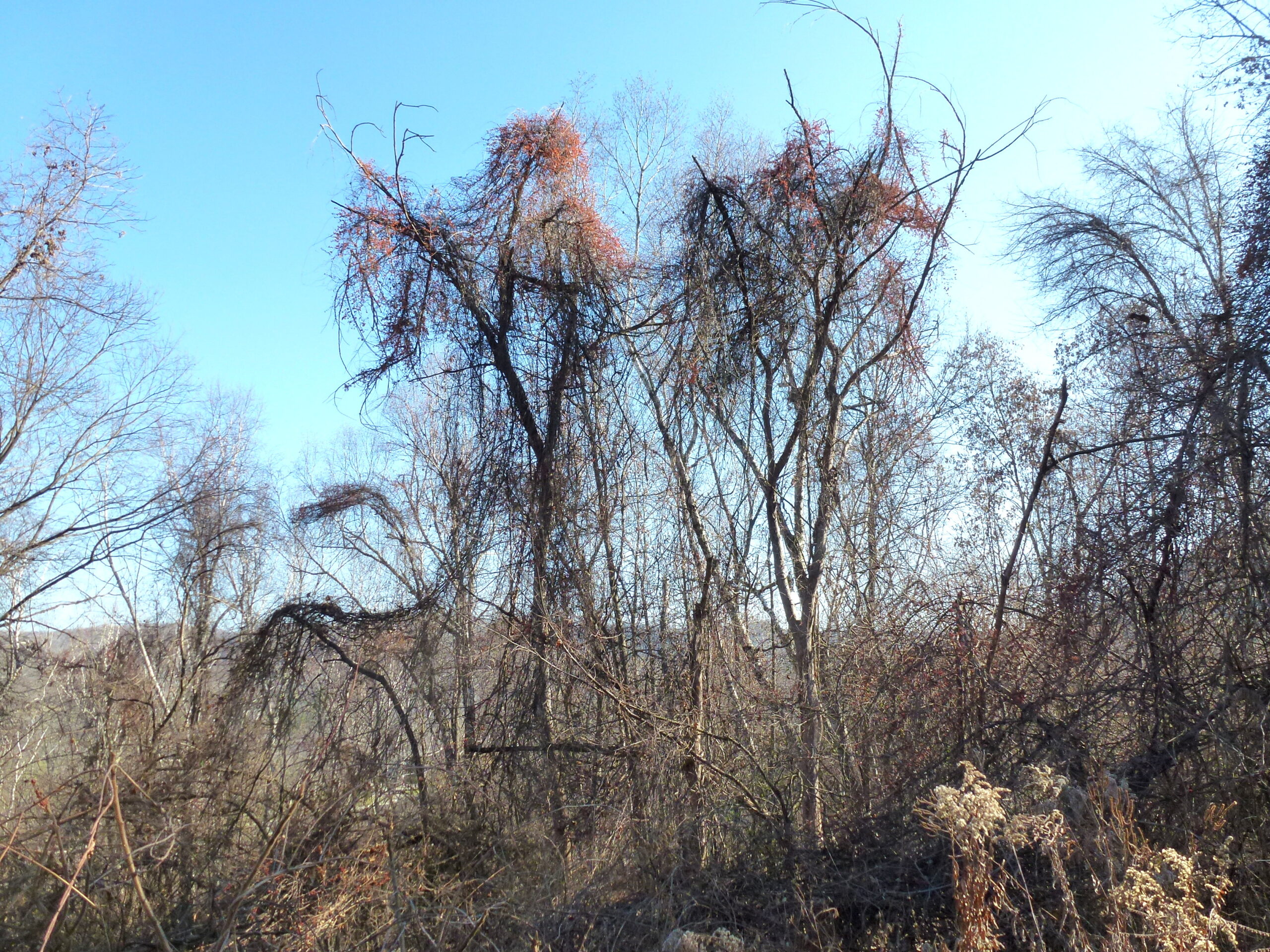November Weed of the Month: Round Leaf Bittersweet Noxious Weed Status Change
Monika Chandler, Minnesota Department of Agriculture
Round leaf bittersweet (Celastrus orbiculatus) is a deciduous woody vine native to eastern Asia. It’s a standout beauty in the fall and winter with bright, red fruit surrounded by yellow capsules. It was introduced as a landscape plant in New York in 1886. The trouble began when it escaped cultivation. Birds and other wildlife eat the fruit containing seed and move the seed to new locations.
Round leaf bittersweet infestations were not documented in Minnesota prior to 2010. It was considered a USDA Plant Hardiness Zone 5 species, and none of Minnesota was Zone 5 until 2012. We thought our winter cold would kill round leaf bittersweet and spare our forests from this destructive vine. Unfortunately, that was not the case.
Without the insects and diseases that keep this vine in check in its native range, the vines have a competitive edge over Minnesota native vegetation. Round leaf bittersweet vines are very cold hardy and grow vigorously here. The vines wrap around tree trunks and overtake the canopy, depriving trees of sunlight. The weight of the vines, especially when covered with snow or ice, eventually bring down the trees. In the end, only round leaf bittersweet vines grow over a fallen forest. This happened in areas of Winona and Red Wing. These communities, often in partnership with the state, have done successful control work.
Fortunately, round leaf bittersweet was not widely sold and planted in Minnesota because it was considered a Zone 5 species. When we began learning about infestations in 2010, the Minnesota Department of Agriculture (MDA) acted quickly to regulate round leaf bittersweet as a Prohibited Eradicate Noxious Weed in 2011. This meant that it could no longer be sold and planted and that existing vines should be eliminated.
The nursery industry was very helpful and quickly pulled stock from sale. University of Minnesota Extension- with assistance from many state, county, and municipal partners- led outreach and trained thousands of people to identify, report, and control the vines. The Environment and Natural Resource Trust Fund supported the trainings and initial control work. Infestation reports streamed in from many areas of central and southeastern Minnesota.
Given that there are currently 1,938 infestations documented in Minnesota, eradication is no longer considered feasible. In 2023 round leaf bittersweet regulation changed to Prohibited Control, meaning that it can’t be sold or planted, and landowners should control the spread of this vine. Realistically, most landowners are not equipped with the forestry mowers and chain saws needed to control this vine. To mitigate the spread of round leaf bittersweet, more funding is needed for the equipment and people necessary to manage this vine.
Deer harvest numbers available online
People who are interested in deer harvest data can find current harvest data and past harvest reports on the Minnesota Department of Natural Resources’ deer reports and statistics webpage (mndnr.gov/mammals/deer/management/statistics.html). The page also features an interactive map and graph that visualize the data.
In Minnesota, archery deer season began Sept. 14 and continues through Tuesday, Dec. 31. Firearms “A” deer season begins Saturday, Nov. 9, with various closing dates depending on a hunter’s Deer Permit Area. Muzzleloader season begins Saturday, Nov. 30, and continues through Sunday, Dec. 15.
Minnesota DNR webinars focus on redhorse fishing, fall birding and photography
The Minnesota Department of Natural Resources invites people interested in wildlife and outdoor skills to check out the fall program schedule for the Minnesota Outdoor Skills and Stewardship webinar series.
On Wednesday, Nov. 13, Monica Bryand, executive director of the Urban Bird Collective, will share tips on photographing birds. Bryand will also talk about some of her favorite birding spots for the fall migration and the work of the Urban Bird Collective.
The Minnesota Outdoor Skills and Stewardship Series webinars are free and offered year-round, though registration is required. Visit the Outdoor Skills and Stewardship webpage of the Minnesota DNR website (mndnr.gov/discover) for the registration portal, more information about upcoming webinars and recordings of past webinars.


